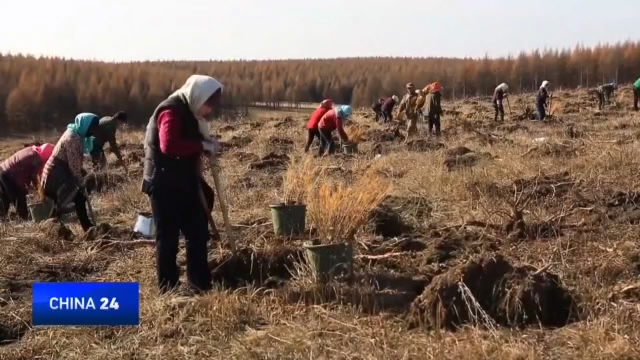
21:48, 04-Dec-2017
55 Years of Green Efforts: Saihanba forest farm's retired & active workers talk of miracles

Three generations of forest rangers established Saihanba Forest Farm in Northern China's Hebei Province. Their 55 years of effort made the woods the world's largest artificial forest. CGTN's Tang Bo went to the farm and talked to two workers to find out how they managed to turn a former waste land green.
72-year old Chen Yanxian is showing me the history of Saihanba Forest Farm. At the age of 19, she came to work at the farm in North China's Hebei Province, 180 kilometers north of Beijing. After over five decades of efforts, Chen and thousands of other co-workers have turned the farm into the world's largest artificial forest. Chen saw a completely different landscape when she first arrived in 1964.
CHEN YANXIAN, RETIRED RANGER SAIHANBA FOREST FARM "It was mainly desert and some grassland when we first arrived. You couldn't imagine the place used to be an imperial hunting ground in the Qing Dynasty. Our offices and dormitories were built with straw. Life at the farm back then was tough."
Inspired by some national model workers, Chen was determined to do something for the country. Her parents happened to know the then head of the farm. So she wrote a letter to the farm leader asking to join the workforce. One month later, she was a farm worker. There were many times the harsh working and living environment made Chen want to leave. But she eventually stayed there for 34 years till retiring.
CHEN YANXIAN, RETIRED FORMER FOREST RANGER "Before I came here, my parents told me that I must stick to my initial decision, no matter how hard the conditions might be. Our country trusted us, that is why we were chosen. Me and my colleagues always gave each other spiritual comfort like that, so that we could stay and continue our work."
TANG BO WEICHANG COUNTY "Saying the older generations might not have many choices back then, and they devoted their entire lives to the career, but for their juniors, they face more options, but still, many of them are determined to carry on"
Yu Shitao is one of the third generation of workers at the forest farm. He started by looking after saplings, rising to become head of one of the farm's six branch. Majoring in forestry, Yu came to work at the farm right after graduating from college. But most of his classmates chose different paths.
YU SHITAO, BRANCH HEAD SAIHANBA MECHANIZED FOREST FARM "Learning forestry is boring. We served internships at forest farms where working and living conditions were hard. Many college students, especially those from cities, didn't want to work in the industry. But I was different. I actually enjoyed working in the field, at the farm."
The artificial forest is huge. But it's still not as strong as natural woods. In order to ensure the forest's stable and healthy growth, a certan degree of manual intervention is necessary.
YU SHITAO, BRANCH HEAD SAIHANBA MECHANIZED FOREST FARM "It takes at least one hundred years to turn a man-made forest into a natural one. And we need to take good care of the trees, protecting them from insects, preventing forest fires, bringing down the plant density as saplings grow, and building up a comprehensive ecosystem for both plants and wild animals."
Yu has also been cooperating with institutions of higher learning, such as Peking University and the Chinese Academy of Forestry Sciences, to improve forest management techniques. Now that planting trees on barren mountains has shown to be successful, Yu is trying to spread the techniques used to other forest farms across the country. Tang Bo, CGTN, Weichang County, Hebei Province.

SITEMAP
Copyright © 2018 CGTN. Beijing ICP prepared NO.16065310-3
Copyright © 2018 CGTN. Beijing ICP prepared NO.16065310-3